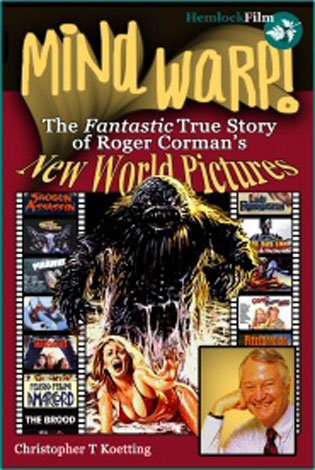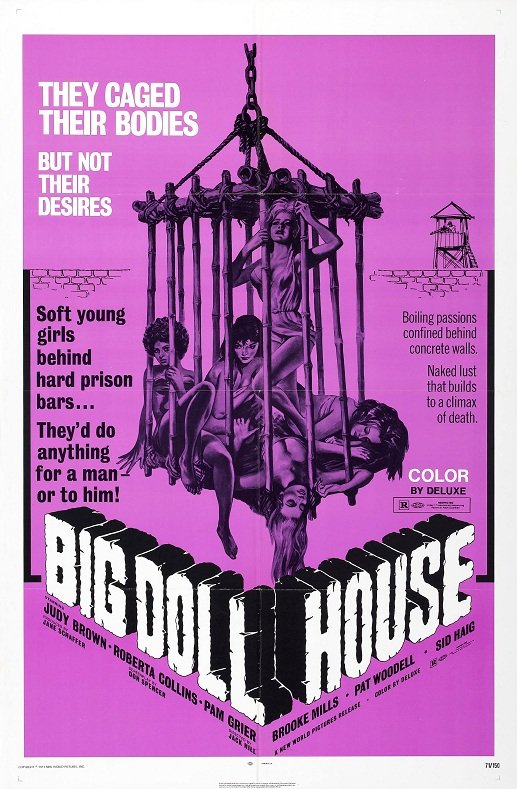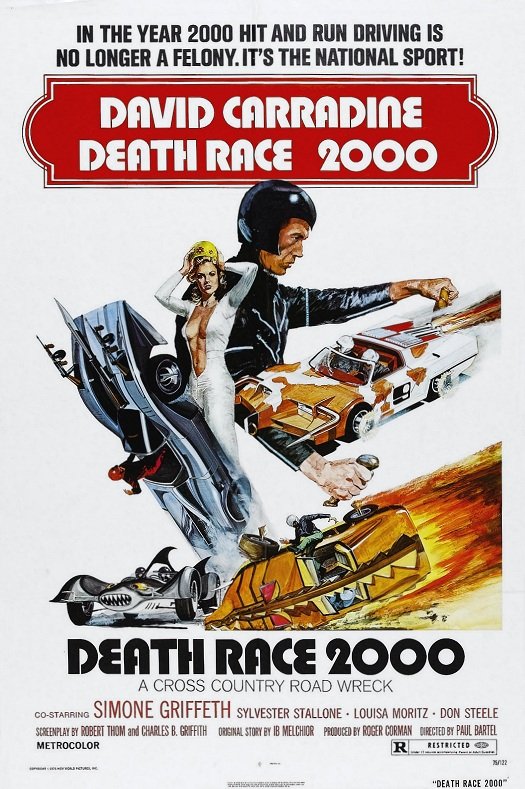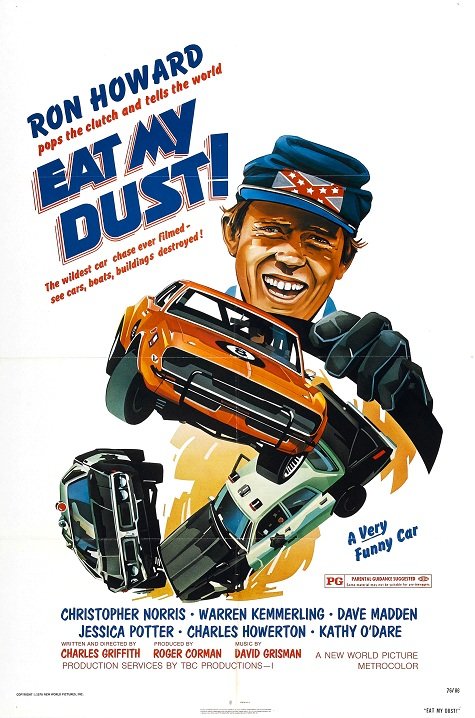MINDWARP: Corman's New World In A "Just The Facts" Style
Roger Corman played a big role in the direction of popular cinema during the 1960's and 1970's. As a result, there a number of biographies available (including an autobiography from Corman himself). However, in-depth accounts of his time running New World Pictures - the bedrock of his reputation as a career-starting mogul - are surprisingly in short supply. Thus, this gap in the historical record makes it possible for Christopher T. Koetting's Mindwarp to be an important book for b-movie historians - and luckily for fans, it delivers the goods in its own brisk but highly informative manner. Mindwarp is a "just the facts" sort of affair, the kind whose approach is established in the first few pages of the book: Koetting dispenses with the obligatory opening biographical chapter and breezes through Corman's early years in about five pages. In doing so, he avoids boring the veteran fans who will be buying this book while offering just enough info to give the newbie a solid basic grounding.From there, Koetting lays out a film-by-film chronicle of Corman's tenure as the head honcho at New World Pictures, roughly from 1970 to 1984. Each film gets at least a few paragraphs and the more noteworthy productions - The Big Doll House, Death Race 2000, etc. - get a few pages. His co-production work with 20th Century Fox during the mid-1970's is also included since projects like Capone and Moving Violation often used the same crews as his New World fare. Brief plot synopses are included for each film discussed and the financial stats of a particular release are usually included (would you believe the biggest Corman-era New World hit was the Don Knotts/Tim Conway comedy The Prize Fighter?).
Mindwarp is a "just the facts" sort of affair, the kind whose approach is established in the first few pages of the book: Koetting dispenses with the obligatory opening biographical chapter and breezes through Corman's early years in about five pages. In doing so, he avoids boring the veteran fans who will be buying this book while offering just enough info to give the newbie a solid basic grounding.From there, Koetting lays out a film-by-film chronicle of Corman's tenure as the head honcho at New World Pictures, roughly from 1970 to 1984. Each film gets at least a few paragraphs and the more noteworthy productions - The Big Doll House, Death Race 2000, etc. - get a few pages. His co-production work with 20th Century Fox during the mid-1970's is also included since projects like Capone and Moving Violation often used the same crews as his New World fare. Brief plot synopses are included for each film discussed and the financial stats of a particular release are usually included (would you believe the biggest Corman-era New World hit was the Don Knotts/Tim Conway comedy The Prize Fighter?). This book also explores the internal politics that shaped the studio's various releases. If you've ever wondered what motivated Corman to sell New World, the reasons and business deals are all covered in exhaustive detail. A brief epilogue chapter offers some details on Concorde pictures and his final directorial venture, Frankenstein Unbound. Another inspired touch is that when an actor or director leaves the New World story, their exit is marked by a few paragraphs that offer a thumbnail sketch of their subsequent career.Mindwarp works well because Koetting strikes the right blend of respect and honesty in approaching his subject. He honors Corman's achievements and is careful to note the many directing and acting careers he sparked. The author also makes note of his willingness to put women in prominent filmmaking and employee positions, which was unique for Hollywood in that era. However, he also
This book also explores the internal politics that shaped the studio's various releases. If you've ever wondered what motivated Corman to sell New World, the reasons and business deals are all covered in exhaustive detail. A brief epilogue chapter offers some details on Concorde pictures and his final directorial venture, Frankenstein Unbound. Another inspired touch is that when an actor or director leaves the New World story, their exit is marked by a few paragraphs that offer a thumbnail sketch of their subsequent career.Mindwarp works well because Koetting strikes the right blend of respect and honesty in approaching his subject. He honors Corman's achievements and is careful to note the many directing and acting careers he sparked. The author also makes note of his willingness to put women in prominent filmmaking and employee positions, which was unique for Hollywood in that era. However, he also  shares the stories where Corman's employees came into conflict with him over his ever more prominent desire to cut corners. He also notes how Corman didn't hesitate to tinker with productions when he thought they weren't commercially viable (two notable cases are Lady Frankenstein and Forbidden World).Koetting's film-by-film approach also allows the reader to get a more balanced portrait of New World Pictures' output. B-movie fans usually think of them as the premier exploitation-flick studio of the 1970's and early 1980's but the truth is New World had a fairly diverse bill of fare, including a frequently profitable sideline in foreign films by the likes of Ingmar Bergman, Federico Fellini and Volker Schlondorff. There are also intriguing accounts of short-lived ventures into television movie production and a misguided attempt to beat Disney at their own game with a kiddie flick called Jimmy The Kid (a vehicle for Gary Coleman, no less).
shares the stories where Corman's employees came into conflict with him over his ever more prominent desire to cut corners. He also notes how Corman didn't hesitate to tinker with productions when he thought they weren't commercially viable (two notable cases are Lady Frankenstein and Forbidden World).Koetting's film-by-film approach also allows the reader to get a more balanced portrait of New World Pictures' output. B-movie fans usually think of them as the premier exploitation-flick studio of the 1970's and early 1980's but the truth is New World had a fairly diverse bill of fare, including a frequently profitable sideline in foreign films by the likes of Ingmar Bergman, Federico Fellini and Volker Schlondorff. There are also intriguing accounts of short-lived ventures into television movie production and a misguided attempt to beat Disney at their own game with a kiddie flick called Jimmy The Kid (a vehicle for Gary Coleman, no less). However, the part of Mindwarp that will impress fans is all the material it offers on Corman projects that never came to be. Like any good cinematic showman, Corman announced more projects than he ever made. Some of the amazing unfilmed projects discussed in this book's pages include The Phildelphia Experiment (with Ron Howard as director), an adaptation of the famous Walker Percy novel The Moviegoer and a Corman-helmed remake of Birth Of A Nation (!!!). There are also excerpts from New World pressbooks for various films, including a hysterical set of suggested promotion ideas for Eat My Dust.In short, Mindwarp is the New World Pictures resource that b-movie fans have been waiting for. If you are looking for a straightforward, well-researched chronicle of this studio's Corman-driven era, you can't go wrong here.
However, the part of Mindwarp that will impress fans is all the material it offers on Corman projects that never came to be. Like any good cinematic showman, Corman announced more projects than he ever made. Some of the amazing unfilmed projects discussed in this book's pages include The Phildelphia Experiment (with Ron Howard as director), an adaptation of the famous Walker Percy novel The Moviegoer and a Corman-helmed remake of Birth Of A Nation (!!!). There are also excerpts from New World pressbooks for various films, including a hysterical set of suggested promotion ideas for Eat My Dust.In short, Mindwarp is the New World Pictures resource that b-movie fans have been waiting for. If you are looking for a straightforward, well-researched chronicle of this studio's Corman-driven era, you can't go wrong here.


